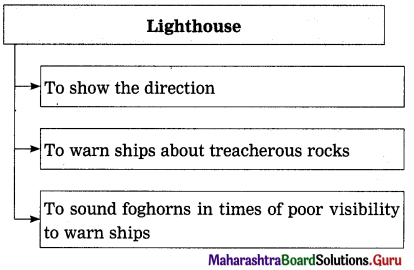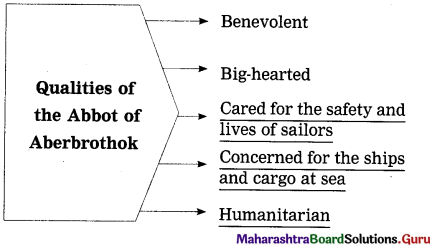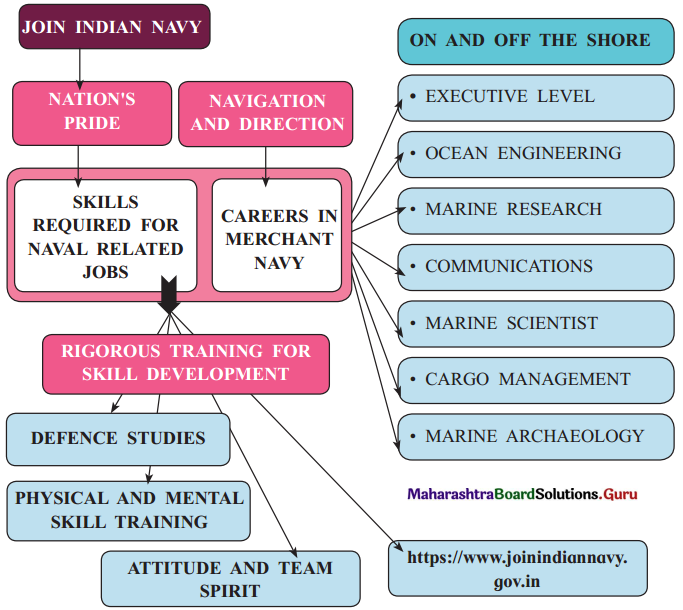Balbharti Yuvakbharati English 12th Digest Chapter 2.3 The Inchcape Rock Notes, Textbook Exercise Important Questions and Answers.
Maharashtra State Board Class 12 English Yuvakbharati Solutions Chapter 2.3 The Inchcape Rock
12th English Digest Chapter 2.3 The Inchcape Rock Textbook Questions and Answers
Question 1.
Prepare a word register related to marine life:
Answer:
sailors; ship; tides; winds; seabed; anchor; captain; submarine; international-waters; port; harbour; shipyard; patrol; trawler; sail; port; starboard; deep-sea.
![]()
Question 2.
The functions of a lighthouse are:

Answer:

Question 3.
Discuss in pairs the various famous rocks in the world and mention the places where they are.
Answer:
| Famous Rock | Place |
| Balancing Rock (Krishna’s butter-ball) 250 tons – balanced on a slope attempts to move it for safety remains v unsuccessful The Trimurti Cave-dedicated to trinity Brahma, Vishnu and Shiva Protected by ASI and UNESCO | Mahabalipuram |
| Ayer’s Rock Called Uluru by Australian Aboriginal has carvings- paintings. | Central Australia |
| Giant’s Causeway – Most of the columns hexagonal, – some four/ five/ seven/ eight sided made up of some 40,000 interlocking basalt columns one of the great natural wonders – World Heritage Site | Northern Ireland |
| Sigiriya rock plateau, formed from magma of an extinct volcano, 200 metres high; UNESCO Heritage Site Ancient hydraulic system – canals, locks, lakes, dams, bridges, fountains, surface/underground water pumps. In rainy season, water begins to circulate in Sigiriya. Fountains built in Fifth century – oldest in the world. | Sri Lanka |
Question 4.
Narrate in the class a story about someone who destroyed or spoilt someone else’s good work.
(Points: A bright Student-Punctual, cheerful, intelligent-Helpful to classmates, explains and lends notes-Tutored junior class students- Jealous group tears up notes before exams-Is able to study with the friends whom he/she helped-The jealous group is outwitted)
![]()
Question 5.
Discuss the following expressions in pairs/groups. Take the help of your teacher.
(a) As you sow so shall you reap.
(b) Crime gets its own punishment
(c) What goes around comes around
(d) Tit for tat
(e) Evil digs a pit for others but falls into the same.
Answer:
All the above are idioms and proverbs. They all convey the same meaning. They all mean that when a person acts with a certain intention, the results will be the same as the action. If the intentions are good the person will benefit from rewards. If the intentions are evil he will be punished.
(A1)
Question 1.
Narrate in groups the scene described in the beginning of the poem.
Points:
A clear calm day at sea
The sea was quiet – the ship is still
The wind is not blowing – the sails unmoving
The waves do not move the Bell
All these point fin first 3 stanzas] to a quiet sea and
calm weather one morning in spring.
(A2)
Question (i)
Complete the following statement:
The Abbot of Aberbrothok placed a bell on the Inchcape Rock because
Answer:
The Abbot of Aberbrothok placed a bell on the Inchcape Rock because there were dangerous rocks near the coast which would wreck ships.
![]()
Question (ii)
Given below are the events that give the theme of the poem in a jumbled form. Arrange in a proper sequence as per their occurrence.
(a) The waves were so small that they did not move enough to ring the bell at the Inchcape Rock.
(b) The Abbot of Aberbrothok had placed the bell on a buoy on the rock.
(c) There was a thick haze spread over the atmosphere.
(d) Ralph bent over from the boat.
(e) Sir Ralph cursed himself in despair and in his frustration tore his hair.
Answer:
(b) The Abbot of Aberbrothok had placed the bell on a buoy on the rock.
(a) The waves were so small that they did not move enough to ring the bell at the Inchcape Rock.
(d) Ralph bent over from the boat.
(c) There was a thick haze spread over the atmosphere.
(e) Sir Ralph cursed himself in despair and in his frustration tore his hair.
Question (iii)
Describe the qualities of the Abbot of Aberbrothok in your own words.

Answer:

Question (iv)
‘Jealousy’ is the most incurable defect, Justify.
Answer:
When someone is in a better position of money or success or fame, there are people who feel that they should destroy that. This is jealousy. We can see people who have more, and we can also work hard to reach that position. But when someone wants to destroy that person who has reached the better position that is wickedness. The jealous person is not willing to work for that state. They will not accept a lesser place also. So a jealous mind-set slowly becomes completely evil.
![]()
Question (v)
‘But the Rover’s mirth was wickedness’. Explain this line in your own words with the help of the extract.
Answer:
The season of spring made everyone feel happy and light-hearted. The Rover was whistling and singing. But this joyful mood made him reckless. He wanted to trouble the Abbot. The Abbot had put a Bell there as a warning about the Inchcape Rock. Ralph rashly decided to undo his good work. The Rover was jealous of the Abbot who was blessed by grateful sailors. He wanted to trouble the Abbot of Aberbrothok.
(A3)
Question 1.
Some words in the poem are related to different parts of a ship or a mariner’s life. Given below are the meanings of those terms. Identify the word.
Answer:
(a) Helps in steering the ship-wheel
(b) The lowest part of the ship – keel
(c) Floating object that shows direction- buoy
(d) Another name for a ship-vessel
(e) Sinking – gurgling
(A4)
Question 1.
Select the appropriate figure of speech from the box given below and complete the table.
Answer:
| Example | FOS | Explanation |
| No stir in the air, no stir in the sea | Repetition | Emphasizes the quiet stillness |
| On a buoy in the storm it floated and swung | Alliteration | The sound of the vowel ‘o’ is repeated |
| The ship was as still as she could be | Personification | The ship is spoken of as ‘she’ as if a human being |
(A5)
Question (i)
Write the appreciation of this poem based on the points given below :
- About the poem/poet and the title
- The theme
- Poetic style
- The language/poetic devices used in the poem
- Special features
- Message, Values, Morals in the poem
- Your opinion about the poem
Answer:
The Poem “The Inchcape Rock’ is about a real stretch of treacherous rocks near the Scottish coast. I Robert Southey wrote prose and other poems too. But this poem is well-liked. The title gives the clue that the rock is a part of an interesting story.
The theme is about an Abbot and a pirate. The Abbot is concerned for his fellow humans and helps to save sailors. He put the Inchcape Bell on a buoy to warn ships day and night of the terrible Inchcape Rock, during storms. [According to records, warning bell was placed.]
But the Rover in a fit of madness, on a spring day, cut the bell just to trouble the Abbot. Many months later, when the pirate was sailing towards Scotland, the weather was different. As the frightened sailors were caught in the dark stormy sea the pirate realised he had not troubled the Abbot but brought ruin for himself and his sailors.
The poem is a ballad. The story is told in stanzas of four lines, with aabb rhyme. The story is told in easy language. The poet uses many Old English words like ‘blest’, ‘Quoth’, and ‘canst’. The poet begins with spring, a metaphor for the pleasant mood, with a calm sea, still air and the ship in quiet waters. Repetition emphasizes the gladness in the heart.
The mood changes from mischief to wickedness. When the mist blocks the sun, metaphor makes the story gloomy, suspenseful. The nightfall is the metaphor for the dark situation for the ship, its sailors. They finally meet a violent end. There is alliteration which adds to the beauty of the poem.
The poem is a didactic one with a clear message – “When we try to trouble others, trouble first comes to the doer.” The story has a moral and is useful even in these times.
![]()
Question (ii)
Compose 4 to 6 lines on ‘Sea’ :
Answer:
Sea
I meet the sky far away, brothers of the same colour.
I mirror his white woolly sheep and birds.
I pull and push; deep down or sometimes upwards
In my cool-world, small and big creatures, softly slither.
(A6)
Question (i)
Expand the ideas on your own on the following topics:
(a) Pride goes before a fall.
(b) Time and tide wait for none.
(c) Man proposes, God disposes.
(d) Look before you leap.
Question (a)
Pride goes before a fall.
Answer:
There is a saying in Sanskrit that translates as “Knowledge brings humility.” The opposite would be that only an ignorant person would be proud or arrogant. A person becomes overconfident about himself or what he has. He starts thinking lowly of others. Only a harsh experience makes him see his stupidity.
There is a story about the God of riches who was drunk on his wealth. He invited all the other gods to a grand feast so that his wealth would be seen by them. He also invited Shiva and Parvati. They gently told him they would not be able to come, They said their son Ganesha would come instead. The host welcomed his guests.
Ganesha also arrived. The guests seated in a dazzling hall ate their fill of the lavish food. They praised the food, the hospitality and took leave impressed by the grandeur of everything there. But Ganesha was still being served. The host was stunned to see the servants running frantically to serve at the little boy’s speed of eating. The cooks were preparing more food. The puzzled King saw to it that Ganesha was served what he wanted.
Then word came from the kitchen that supplies were needed. Soon the supplies in adjacent villages were empty. Ganesha in anger chased the King till he ran to Shiva’s abode. Ganesha complained he was not fed. The King realized his foolishness trying jto impress the Lord and Mother with his riches. He went humbled, not able to feed one child.
Hence how much ever one possesses one must not think lowly of others. The right kind of knowledge makes a person more and more humble. Like the tree full of fruits bends lower and lower.
Question (ii)
The poem begins with:
‘Without either sign or sound of their shock, The waves flowed over the Inchcape Rock.’
It ends with:
On the basis of these lines explain the change in mood of the poem.
Answer:
At the beginning of the poem the season is spring, the weather is mild and the sea-waters are calm. The waves pour softly over the Inchcape Bell. The Heavy Bell on a buoy would ring due to strong waves only in stormy weather.
When the Rover cut the Bell it was spring season. The mood was happy, light-hearted. He was up to mischief in a rash, jolly mood on a lovely spring day. He wanted to only trouble the Abbot.
After undoing the Abbot’s good work the Rover went away on his criminal voyages. But when he was returning the sea was stormy. Wild winds threw the ship off course. The mood is of confusion and fear because a thick fog covered them from the sun. The mood is of suspense, the sailors are lost.
By nightfall they did not still know where they were. They are really and metaphorically in the dark. They could hear the waves crashing yet they did not know which land was near. There is fear. There was no wild wind but the rough sea was pulling their ship along. They desperately wanted some clue to help them to know their location. The ship shattered onto the rocks as the Rover yelled and cursed. The dramatic end is violent and filled with despair.
![]()
(A7)
Question (i)
Read the tree diagrams and information given on pages 109-110 of the textbook and find out more information about opportunities in ‘on and off the shore’ the Indian Navy.

Question (ii)
Required qualifications and various fields/opportunities for women to join in the Navy.

![]()
Question (iii)
Colleges that provide education in oceanography-
National Institute of Oceanography, Goa
National Institute of Oceanography, Mumbai
MBA (Logistic Shipping Management), IIKM Business School, Calicut, Kerala
Indira Gandhi College of Distance Education IGCDE, Tamil Nadu
Yuvakbharati English 12th Digest Chapter 2.3 The Inchcape Rock Additional Important Questions and Answers
Read the extract and complete the activities given below:
Global Understanding:
Question 1.
Give reasons for the sailors’ appreciation of the Abbot.
Answer:
There were some dangerous rocks near the Scottish coast. The Abbot of Aberbrothok had placed a buoy and fixed a bell on it, near those rocks. If the sea was rough sailors could spot the buoy. Even in the darkness the rough seas made the bell ring. So by day or night the Abbot’s bell saved the sailors and their ships from the rocks, and they blessed him.
Question 2.
Complete the following:
‘Wheel’d round’ here implies
Answer:
Wheel’d around here implies a flock of birds flying round in circles, which looks like a wheel.
Question 3.
Describe the state of mind of Ralph.
Answer:
Ralph the Rover also felt the effects of the season of spring. He felt very cheerful; he whistled and sang as he walked about on the deck. He was in an extremely happy state of mind but his joy was evil in intentions.
![]()
Question 4.
Complete the following:
Answer:
The pirate asked his men to row him over to the Inchcape Bell. He then bent over and cut the Bell from the buoy. He did so that the sailors of the next ship would no longer bless the Abbot for placing the warning Bell.
Question 5.
Choose the words and phrases that could describe Sir Ralph the Rover.
(a) Criminal
(b) Jealous
(c) Arrogant
(d) Vicious
(e) Spiteful
Answer:
All of the above
Question 6.
Choose the correct option:
On spotting the bell, Rover cut the bell from the buoy. This was an act of:
(a) Hatred
(b) Anger
(c) Jealousy
(d) Frustration
Answer:
(c) Jealousy
Question 7.
‘O Christ! It is the Inchcape Rock’ – Give reasons for Ralph’s Exclaimation.
Answer:
The Rover’s ship had struck the terrible rocks feared by sailors. Some time ago he himself had cut off the Bell put there by the blessed Abbot. Now his own ship had hit the Inchcape Rock and was going to sink with all his riches. He too was sure about to die.
Question 8.
Complete the following statements:
Answer:
1. The result of the thick haze that covered the sky was that the sailors had no way of knowing in which direction they were sailing.
2. The Rover in frustration pulled his hair and cursed himself because he himself had cut the Bell which would have rang and the sound would have helped them to save themselves from those killer-rocks.
![]()
Inference/Interpretation/Analysis:
Question 1.
The pirate is given the title ‘Sir’ though he was a feared criminal. He is called a ‘rover’. Give reasons for the same.
Answer:
Though he was a feared criminal Ralph was the captain of his ship. The crew may have addressed him ‘Sir’ which explains it attached to his name. A rover is a person, animal, or thing that roves, or wanders, Ralph the pirate roamed around on the seas looking for ships to attack and loot. Maybe that is why he was called Ralph the Rover.
Question 2.
The poet gives hints to the reader in the second stanza of the extract. Find the significant line from the extract and give reason for your answer.
Answer:
The second stanza of this extract tells about what the pirate did after removing the Bell. He roamed the seas and carried on his evil activities, killing and looting.
The last line is the hint of what is to happen later. ‘He steers his course for Scotland’s shore.’ The rover set the course ‘for Scotland’s shores’. This is significant because the treacherous Inchcape Rock was on the Scottish shores. So we get an idea that something may happen there.
Question 3.
Read the following lines and say what the situation was:
‘For me thinks we should be near the shore’. ‘Now where we are I cannot tell,’
Answer:
The sailors could hear the waves crashing on the shore. But they had been blown about by wild winds all day and so did not where they had reached. They did not know which land or shore was near. The situation was that danger was near.
Question 4.
Explain the danger implied in the two lines:
‘They hear no sound, the swell is strong; Though the wind hath fallen they drift along,’
Answer:
There was no sound except the breakers crashing on a nearby shore. There was no wind. But the sea was rough and the strong sea pulled the helpless ship along. The sailors were confused and could not make out which was the safe direction.
![]()
Personal Response:
Question 1.
Write an account of something which you did out of concern for others.
Answer:
In our colony there is a young couple living with twin toddlers and elderly parents. The young man is a doctor and his working hours are sometimes unpredictable.
My family is aware of this and we help in small ways. I help the elderly lady to take a walk on the street and my brother helps the gentleman. I also help the young mother to mind the small children if she has to go out shopping. I sometimes run errands for them too.
Question 2.
Give your opinion on the following line and explain its significance.
‘Quoth Sir Ralph, ‘The next who comes to the Rock
Won’t bless the Abbot of Aberbrothok.’
Answer:
The Pirate says these words after he cut the Bell placed by the Abbot. The Abbot had placed it for saving others. This act had brought fame for the Abbot and also the blessings of the many sailors that were saved. But the pirate was jealous of the fame. He cut the Bell thinking to harm the Abbot. When someone is concerned about others they are not looking for fame. But a selfish person is blinded by jealousy. They behave foolishly and cause trouble only for themselves.
Question 3.
‘Now where we are I cannot tell,
But I wish I could hear the Inchcape Bell’ From these lines describe the thoughts of
(a) ……… the sailors in the Rover’s ship.
(b) ……. the Rover’s.
Answer:
(a) The sailors must have been terrified. They may have been feeling angry with their Captain for his senseless act of cutting off the Inchcape Bell. It would be useful now to save them.
(b) The captain of the pirates must have been going mad with fear of the possible crash and sure death of everyone on board. He did not know where his ship was located. He was wondering if they were going to Crash on the Inchcape Rock. He had ensured his own destruction and death by cutting the Bell.
![]()
Poetic Devices:
Question 1.
Pick out the examples of imagery from the extract, state what kind it is and explain.
Answer:
Example of Visual imagery from the extract:
1. ‘The ship was as still as she could be’.
2. ‘Her keel was steady in the ocean’. Both the lines depict how the ship was on the sea, almost unmoving.
3. ‘The waves flow’d over the Inchcape Rock;
So little they rose, so little they fell,
They did not move the Inchcape Bell.’
These lines in the second stanza describe the very mild sea and the small waves.
Examples of Sound imagery from the extract:
1. And over the waves its warning rung. The line describes the loud warning sounded by the Inchcape Bell in a storm,
2. ‘And there was joyance in their sound.’ These lines show an air of joy in that scene. Even the birds seemed to be flying round and round – like a wheel – ‘wheel’d round’, ‘joyance in their sound’.
Question 2.
Pick out the examples of imagery from the extract, state what kind it is and explain.
Answer:
The lines with Visual imagery:
1. The Sun in heaven was shining gay,
The Sun shone bright and made the morning cheerful.
2. The sea birds screamed as they wheel’d round,
The birds seemed to be flying round and round in joy, like a wheel.
Examples of Sound imagery from the extract:
1. And over the waves its warning rung. The line describes the loud warning sounded by the Inchcape Bell in a storm.
2. ‘The sea-birds scream’d as they wheel’d round
And there was joyance in their sound.’
These lines show an air of joy in that scene. Even the birds seemed to be happy as their calls seemed like they were screaming in joy, ‘joyance in their sound’.
Question 3.
‘Gurgling sound’. Find the figure of speech.
Answer:
This is onomatopoeia. The pronunciation of the word resembles the meaning – the sound of an object sinking and bubbles rising and bursting.
![]()
Question 4.
Pick out an example of imagery from the extract.
Answer:
‘So thick a haze o’erspreads the sky,
They cannot see the Sun on high.’
The reader is able to imagine the fog so dense that the sun is blocked out. This is visual imagery.
Poetic Creativity:
Question 1.
Compose 2-4 lines using “A Song in the Air” as the theme. You could begin with…
‘The leaves rustle gently….’
Answer:
‘The leaves rustle gently and flowers nod. The droplets gather into a bigger drop The birds shake their plumes, bright-eyed. A song is in the air, the new day, a pretty bride.’
Question 2.
Compose 2-4 lines with one of the following as the theme : anger/ hatred/jealousy
Answer:
The Enemy Inside
I don’t know where he hides everyday He flashes in my eyes, in some words I say
To elders, family, friends. I am surprised
By my own words, my actions, only later I cried.
Question 3.
Compose 2-4 lines with one of the following as the theme:
Answer:
I Regret
I think of the harsh remark
The careless action I threw
I vow not to repeat anymore
As I begin this day new.
![]()
Writing Skills:
Question (a)
Time and tide wait for none Points:
There is a time for doing each thing
- Postponing action is laziness
- If the time for the action is lost the opportunity is lost for ever.
- Only regret remains.
Question (b)
Man proposes, God disposes
Points:
- It is in one’s power to plan a way of doing things
- It is a smart thing to prepare in advance
- In spite of planning we may not be able to carry on with the plan due to circumstances
- We must accept the unexpected circumstances and yet go ahead by some other method
- We must be flexible and find an alternative way
- It is smart to always have a Plan B ready
Question (c)
Look before you leap Points:
- Before we act one must think of the results
- only a fool will act without thinking of the future consequences of the present action
- if we think the results are going to harm someone, one must not do that
- It is also a good thing to take the advice of experienced or elders when making important decisions.